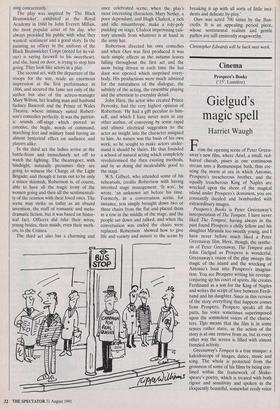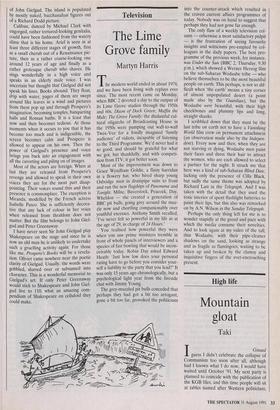Cinema
Gielgud's magic spell
Harriet Waugh
From the opening scene of Peter Green- away's new film, where Ariel, a small, red- haired cherub, pisses in one continuous stream into a Romanesque bath, thus cre- ating tho storm at sea in which Antonio, Prospero's treacherous brother, and the equally treacherous King of Naples are wrecked upon the shore of the magical island under Prospero's dominion, you are constantly dazzled and bombarded with extraordinary images.
Prospero's Books is Peter Greenaway's interpretation of The Tempest. I have never liked The Tempest, having always in the past found Prospero a chilly fellow and his daughter Miranda too sweetly young, and I have never before much liked a Peter Greenaway film. Here, though, the synthe- sis of Peter Greenaway, The Tempest and John Gielgud as Prospero is wonderful. Greenaway's vision of the play sweeps the magic of the island and the wrecking of Antonio's boat into Prospero's imagina- tion. You see Prospero writing his revenge: conjuring up his court of spirits. He creates Ferdinand as a son for the King of Naples and writes the script of love between Ferdi- nand and his daughter. Since in this version of the story everything that happens comes from Prospero, Prospero speaks all the parts, his voice sometimes superimposed upon the somnolent voices of the charac- ters. This means that the film is in some senses rather static, as the action of the story is at one remove from us, but in every other way the screen is filled with almost frenzied activity.
Greenaway's Tempest is a true masque: a kaleidoscope of images, dance, music and song. The whole is protected from the grossness of some of his films by being con- fined within the framework of Shake- speare's poetry, which is treated with both rigour and sensitivity and spoken in the eloquently beautiful, somewhat reedy voice
of John Gielgud. The island is populated by mostly naked, bacchanalian figures out of a Richard Dodd picture.
Caliban, danced by Michael Clark with engorged, rather tortured-looking genitalia, could have been fashioned from the watery slime that is his home. Ariel is seen in at least three different stages of growth, first as a small cherub out of a Renaissance pic- ture, then as a rather coarse-looking one around 12 years of age and finally as a rather grotesque cherub who shaves. He sings wonderfully in a high voice and speaks in an elderly male voice. I was uncertain but thought that Gielgud did not speak his lines. Books abound. They float, drip with water, pages of them are swept around like leaves in a wind and pictures from them pop up and through Prospero's imagination, becoming temples, banqueting halls and Roman baths. It is a feast that now and then becomes tedious. At those moments when it occurs to you that it has become too much and is indigestible, the screen becomes calm and Prospero is allowed to appear on his own. Then the power of Gielgud's presence and voice brings you back into an engagement with all the cavorting and piling on of images.
Most of the actors are foreign. When at last they are released from Prospero's revenge and allowed to speak in their own voices they are for the most part disap- pointing. Their voices sound thin and their presence is commonplace. The exception is Miranda, modelled by the French actress Isabelle Pasco. She is sufficiently decora- tive that any lack of colour in her voice when released from thraldom does not matter. But the film belongs to John Giel- gud and Peter Greenaway.
I have never seen Sir John Gielgud play Shakespeare on the stage and since he is now an old man he is unlikely to undertake such a gruelling activity again. For those like me, Prospero's Books will be a revela- tion. Olivier came nowhere near the poetic clarity of Gielgud. Usually, the words were gobbled, slurred over or subsumed into character. This is a wonderful memorial to Gielgud's art. If only Peter Greenaway would stick to Shakespeare and John Giel- gud live to 110, what an amazing com- pendium of Shakespeare on celluloid they could make.











































 Previous page
Previous page